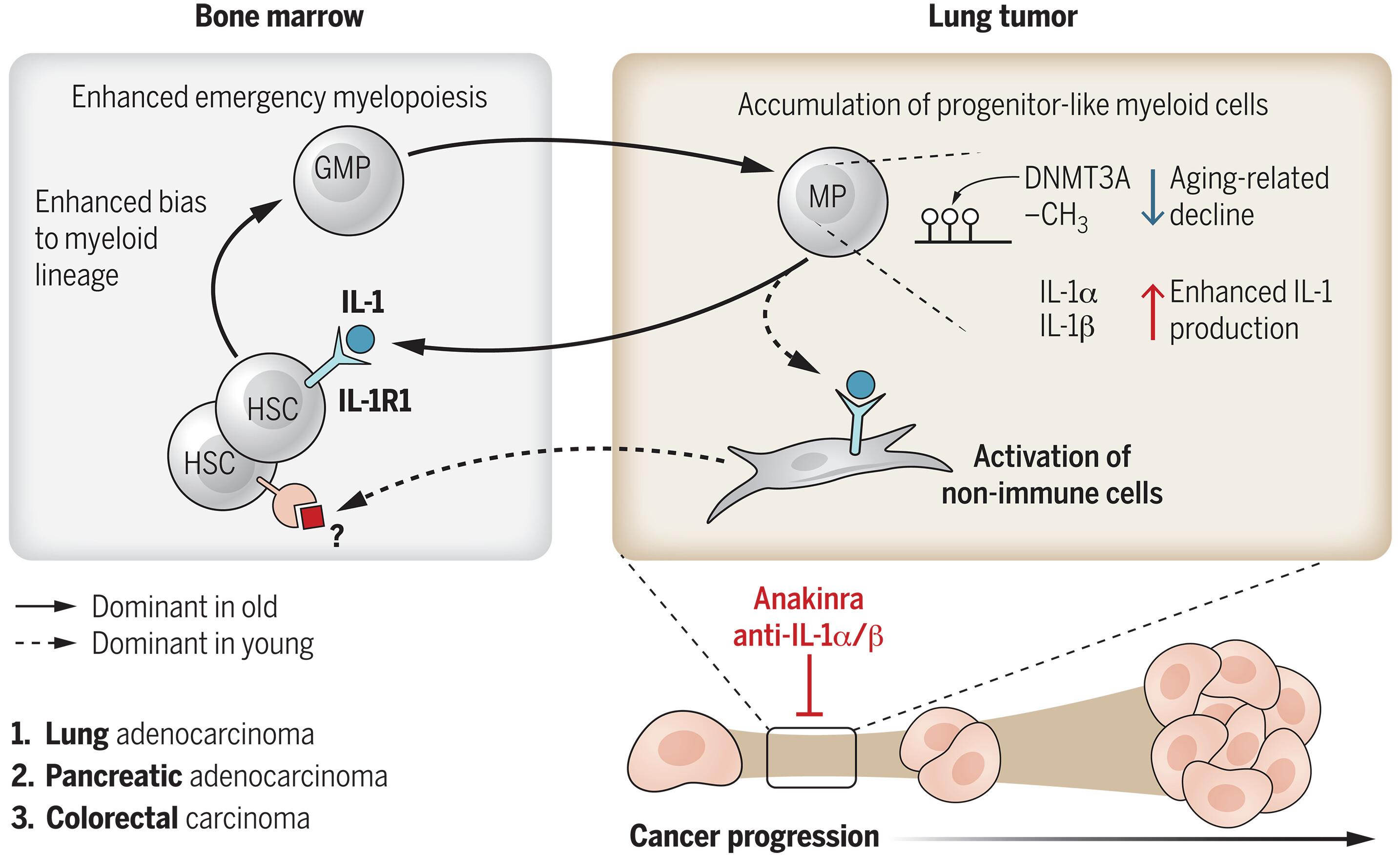Hematopoietic aging promotes cancer by fueling IL-1⍺–driven emergency myelopoiesis
IF 44.7
1区 综合性期刊
Q1 MULTIDISCIPLINARY SCIENCES
引用次数: 0
Abstract
Age is a major risk factor for cancer, but how aging impacts tumor control remains unclear. In this study, we establish that aging of the immune system, regardless of the age of the stroma and tumor, drives lung cancer progression. Hematopoietic aging enhances emergency myelopoiesis, resulting in the local accumulation of myeloid progenitor–like cells in lung tumors. These cells are a major source of interleukin (IL)–1⍺, which drives the enhanced myeloid response. The age-associated decline of DNA methyltransferase 3A enhances IL-1⍺ production, and disrupting IL-1 receptor 1 signaling early during tumor development normalized myelopoiesis and slowed the growth of lung, colonic, and pancreatic tumors. In human tumors, we identified an enrichment for IL-1⍺–expressing monocyte-derived macrophages linked to age, poorer survival, and recurrence, unraveling how aging promotes cancer and offering actionable therapeutic strategies.

造血衰老通过助长IL-1⍺驱动的紧急骨髓造血来促进癌症。
年龄是癌症的主要风险因素,但衰老如何影响肿瘤控制仍不清楚。在这里,我们证实,免疫系统的衰老(与基质和肿瘤的年龄无关)会推动肺癌的进展。造血衰老会增强紧急骨髓造血,导致髓样祖细胞在肺肿瘤局部聚集。这些细胞是IL-1⍺的主要来源,而IL-1⍺可驱动增强的髓系反应。与年龄相关的DNMT3A衰退会增强IL-1⍺的产生,在肿瘤发生的早期破坏IL-1R1信号可使骨髓造血正常化,并减缓肺、结肠和胰腺肿瘤的生长。在人类肿瘤中,我们发现表达IL-1⍺的单核细胞衍生巨噬细胞的富集与年龄、较差的存活率和复发有关,这揭示了衰老如何促进癌症的发生,并提供了可行的治疗策略。
本文章由计算机程序翻译,如有差异,请以英文原文为准。
求助全文
约1分钟内获得全文
求助全文
来源期刊

Science
综合性期刊-综合性期刊
CiteScore
61.10
自引率
0.90%
发文量
0
审稿时长
2.1 months
期刊介绍:
Science is a leading outlet for scientific news, commentary, and cutting-edge research. Through its print and online incarnations, Science reaches an estimated worldwide readership of more than one million. Science’s authorship is global too, and its articles consistently rank among the world's most cited research.
Science serves as a forum for discussion of important issues related to the advancement of science by publishing material on which a consensus has been reached as well as including the presentation of minority or conflicting points of view. Accordingly, all articles published in Science—including editorials, news and comment, and book reviews—are signed and reflect the individual views of the authors and not official points of view adopted by AAAS or the institutions with which the authors are affiliated.
Science seeks to publish those papers that are most influential in their fields or across fields and that will significantly advance scientific understanding. Selected papers should present novel and broadly important data, syntheses, or concepts. They should merit recognition by the wider scientific community and general public provided by publication in Science, beyond that provided by specialty journals. Science welcomes submissions from all fields of science and from any source. The editors are committed to the prompt evaluation and publication of submitted papers while upholding high standards that support reproducibility of published research. Science is published weekly; selected papers are published online ahead of print.
 求助内容:
求助内容: 应助结果提醒方式:
应助结果提醒方式:


